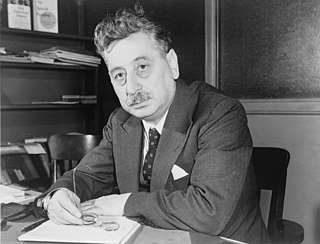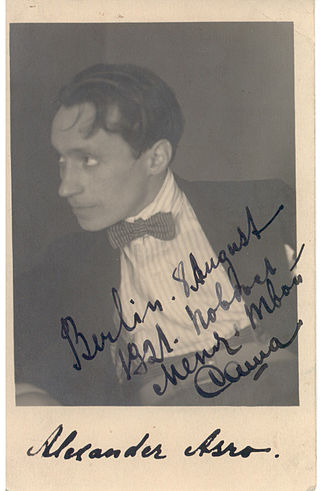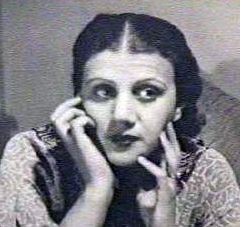
Tevye the Dairyman, also translated as Tevye the Milkman is the fictional narrator and protagonist of a series of short stories by Sholem Aleichem, and their various adaptations, the most famous being the 1964 stage musical Fiddler on the Roof and its 1971 film adaptation. Tevye is a pious Jewish dairyman living in the Russian Empire, the patriarch of a family including several troublesome daughters. The village of Boyberik, where the stories are set, is based on the town of Boyarka, Ukraine, then part of the Russian Empire. Boyberik is a suburb of Yehupetz, where most of Tevye's customers live.

Sholem Asch, also written Shalom Ash, was a Polish-Jewish novelist, dramatist, and essayist in the Yiddish language who settled in the United States.

Yiddish theatre consists of plays written and performed primarily by Jews in Yiddish, the language of the Central European Ashkenazi Jewish community. The range of Yiddish theatre is broad: operetta, musical comedy, and satiric or nostalgic revues; melodrama; naturalist drama; expressionist and modernist plays. At its height, its geographical scope was comparably broad: from the late 19th century until just before World War II, professional Yiddish theatre could be found throughout the heavily Jewish areas of Eastern and East Central Europe, but also in Berlin, London, Paris, Buenos Aires and New York City.
The Vilna Troupe, also known as Fareyn Fun Yiddishe Dramatishe Artistn and later Dramă şi Comedie, was an international and mostly Yiddish-speaking theatre, one of the most famous in the history of Yiddish theater. It was formed in and named after the city of Vilnius (Vilna) in the Russian Empire, later capital city of Lithuania. Distinctly Modernist, and strongly influenced by Russian literature and by the ideas of Konstantin Stanislavski, their travels in Western Europe and later to Romania played a significant role in the dissemination of a disciplined approach to acting that continues to be influential in the present day.

David Kessler (1860–1920) was a prominent actor in the first great era of Yiddish theater. As a star Yiddish dramatic performer in New York City, he was the first leading man in Yiddish theater to dispense with incidental music.

Peretz Hirshbein ; 7 November 1880, Kleszczele, Grodno Governorate – 16 August 1948, Los Angeles) was a Yiddish-language playwright, novelist, journalist, travel writer, and theater director. Because his work focused more on mood than plot, he became known as "the Yiddish Maeterlinck". His work as a playwright and through his own short-lived but influential troupe, laid much of the groundwork for the second golden age of Yiddish theater that began shortly after the end of World War I. The dialogue of his plays is consistently vivid, terse, and naturalistic. Unusually for a Yiddish playwright, most of his works have pastoral settings: he had grown up the son of a miller, and made several attempts at farming.

Yiddish literature encompasses all those belles-lettres written in Yiddish, the language of Ashkenazic Jewry which is related to Middle High German. The history of Yiddish, with its roots in central Europe and locus for centuries in Eastern Europe, is evident in its literature.

Alexander Asro was a film and theatre actor. He was a member of the Vilna Troupe and appeared in several comedic films in the United States.
Seymour Rexite, originally Shayele Rechtzeit, was a Polish American singer and actor. He was a significant figure in Yiddish theatre in the United States, and with his wife Miriam Kressyn he performed on the radio over four decades, performing pop standards in Yiddish. He also served as president of the Hebrew Actors' Union.
Miriam Kressyn, one of the "First Ladies of the Yiddish Theater", acted and sang on stage, film and radio; she wrote plays as well.

Joseph Rumshinsky (1881–1956) was a Jewish composer born near Vilna, Lithuania. Along with Sholom Secunda, Alexander Olshanetsky and Abraham Ellstein, he is considered one of the "big four" composers and conductors of American Yiddish theater.
Joachim Neugroschel was a multilingual literary translator of French, German, Italian, Russian, and Yiddish. He was also an art critic, editor, and publisher.

Shmuel Niger was a Yiddish writer, literary critic and historian and was one of the leading figures of Yiddish cultural work and Yiddishism in pre-revolution Russia.

Luba Kadison Buloff was a Lithuanian Jewish actress, active for decades in Yiddish theatre, in both Europe and the United States.

Indecent is a 2015 American play by Paula Vogel. It recounts the controversy surrounding the play God of Vengeance by Sholem Asch, which was produced on Broadway in 1923, and for which the producer and cast were arrested and convicted on the grounds of obscenity.

Joseph Buloff was a Jewish actor and director known for his work in Broadway and Yiddish theatre. He received the Itzik Manger Prize for contributions to Yiddish letters in 1974.
Eleanor Reissa is an American actress, singer, theatre director, playwright, librettist, choreographer, translator, and author based in New York City. She works and performs in English and Yiddish speaking stages, and also interprets and performs Yiddish theatre and songs.

Miriam Orleska was an actress in the Vilna Yiddish theatre, best known for her role as Leah in S. Ansky's The Dybbuk.

"Ikh Hob Dikh Tsu Fil Lib" is one of the most popular love songs written in Yiddish.

Chaim Shmuel Towber was an American and Canadian actor of Jewish-Ukrainian descent, best known as the author of the song "I Love You So Much".














